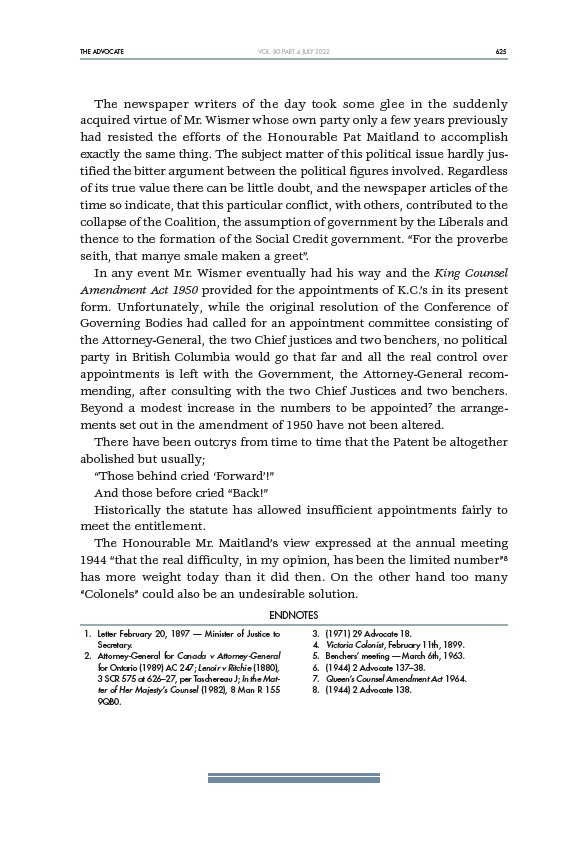
THE ADVOCATE 625
VOL. 80 PART 4 JULY 2022
The newspaper writers of the day took some glee in the suddenly
acquired virtue of Mr. Wismer whose own party only a few years previously
had resisted the efforts of the Honourable Pat Maitland to accomplish
exactly the same thing. The subject matter of this political issue hardly justified
the bitter argument between the political figures involved. Regardless
of its true value there can be little doubt, and the newspaper articles of the
time so indicate, that this particular conflict, with others, contributed to the
collapse of the Coalition, the assumption of government by the Liberals and
thence to the formation of the Social Credit government. “For the proverbe
seith, that manye smale maken a greet”.
In any event Mr. Wismer eventually had his way and the King Counsel
Amendment Act 1950 provided for the appointments of K.C.’s in its present
form. Unfortunately, while the original resolution of the Conference of
Governing Bodies had called for an appointment committee consisting of
the Attorney-General, the two Chief justices and two benchers, no political
party in British Columbia would go that far and all the real control over
appointments is left with the Government, the Attorney-General recommending,
after consulting with the two Chief Justices and two benchers.
Beyond a modest increase in the numbers to be appointed7 the arrangements
set out in the amendment of 1950 have not been altered.
There have been outcrys from time to time that the Patent be altogether
abolished but usually;
“Those behind cried ‘Forward’!”
And those before cried “Back!”
Historically the statute has allowed insufficient appointments fairly to
meet the entitlement.
The Honourable Mr. Maitland’s view expressed at the annual meeting
1944 “that the real difficulty, in my opinion, has been the limited number”8
has more weight today than it did then. On the other hand too many
“Colonels” could also be an undesirable solution.
ENDNOTES
1. Letter February 20, 1897 — Minister of Justice to
Secretary.
2. Attorney-General for Canada v Attorney-General
for Ontario (1989) AC 247; Lenoir v Ritchie (1880),
3 SCR 575 at 626–27, per Taschereau J; In the Matter
of Her Majesty’s Counsel (1982), 8 Man R 155
9QB0.
3. (1971) 29 Advocate 18.
4. Victoria Colonist, February 11th, 1899.
5. Benchers’ meeting — March 6th, 1963.
6. (1944) 2 Advocate 137–38.
7. Queen’s Counsel Amendment Act 1964.
8. (1944) 2 Advocate 138.